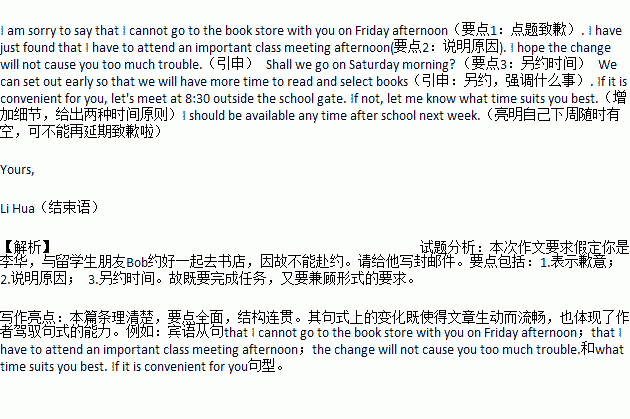题目内容
假定你是李华,与留学生朋友Bob约好一起去书店,因故不能赴约。请给他用英语写封邮件,内容包括:
1.表示歉意;
2.说明原因;
3.另约时间。
注意:1. 词数100左右。
2. 可适当增加细节,以使行文连贯;
3.开头和结尾已为你写好。
Dear Bob,
__________________________________________________________________________________________________________________________________________________________________________________________________________________________________________________________________________________________________________________________________________________________________________________________________________________________________________________________
Yours,
Li Hua
 阅读快车系列答案
阅读快车系列答案Stress(压力) is everywhere in our everyday life. Not only men have it, but also women and young people.
The most important reasons of stress are:death, diseases, exams, making money, getting married, moving houses, changing jobs, ending friendships and so on …
How do you know whether you have stress? Could you give your answers to the following questions?
Yes | No | |
Do you easily get angry? | ||
Do you often sleep badly? | ||
Do you get headaches a lot? | ||
Do you take sleeping pills? | ||
Do you find it difficult to relax? | ||
Do you usually hide your feelings? | ||
Do you smoke and drink a lot to keep quiet? | ||
Do you find it difficult to put your heart into something? |
If you answer “Yes” to more than two of these questions, you are one of those people with stress. So what can you do about it?
Doing relaxing exercises, talking with friends and listening to light music are all usual ways of relieving(减轻) stress. However, doctors now say that there are easier ways—people should laugh and smile more often. When you laugh and smile, your body relaxes. They also say that people, especially men, should cry more often, because crying is the natural way of relieving stress.
1.Who has got stress in his everyday life?
A. Men. B. Women.
C. Young people. D. All the above.
2.If you have over problems listed in the table, you are the person with stress.
A. two B. three
C. five D. eight
3.Which of the followings is NOT the reason of stress?
A. Taking exams. B. Changing jobs.
C. Taking sleeping pills. D. Making money.

